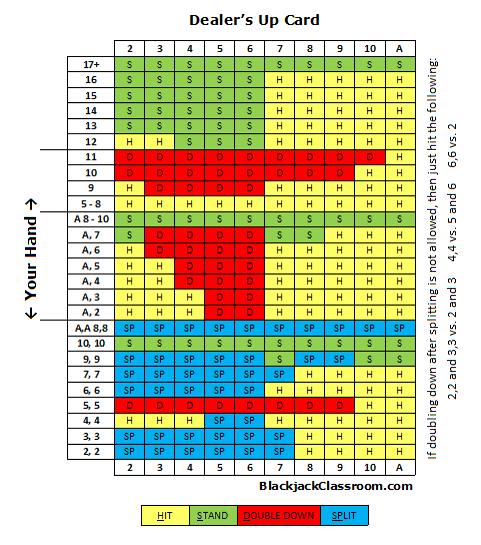Critical Play: Blackjack
Blackjack is a card game that relies mostly on chance. The player gets dealt cards, and the goal is to be closer to 21 than the dealer without going over. While there is some strategy involved in deciding whether or not to get another card, the game is decided by chance. Blackjack uses this reliance on chance as well as a feeling of control given to the player that feed addiction.
Blackjack is a gambling game that embodies what it means to have a gambling addiction: you try and get closer and closer to 21, and in order to not lose everything you have to know when to stop. Some people are willing to take more chances, and some aren’t, but there is also a purely mathematical strategy to blackjack that helps players to decide when to hit and when to stay. 
With this chart, you can memorize what situations you are supposed to hit, and when you are supposed to stay in order to get the highest probability of winning each hand. This replaces real-time strategy and decision making with a predetermined strategy, and in doing so makes the player put all of their faith into chance. If you follow these rules without fail for every hand, then whenever you lose you feel like “it was just an unlucky hand, according to the chart I should have won”. Because of this, it feeds gambling addiction because players might feel like if they just keep playing according to the chart, no matter how much money they have lost, they should get it back in theory.
Compare blackjack to a game like poker. While there are definitely similarities, poker is much more complex and requires much more strategy than blackjack. There is no cheat sheet for poker to know what to do in any given situation, because in blackjack everything is very clearly defined. Also, in blackjack you are only competing against the dealer, not the other players, while in poker you play against all the other players. While there are chance parts of poker in the cards you are dealt, success isn’t defined by what cards a player is dealt, but its defined by how the player uses dynamics with other players to either get them to fold or to get enough information so that they know that they should fold to avoid losing money. Because poker’s success isn’t determined in large part by chance, poker doesn’t feed addiction in the same way that blackjack does. There are other kinds of addiction that poker might feed, such as competition, but it isn’t the same addiction that blackjack feeds because you can get better at it. In blackjack there is a limit to how good you can be at it based on how much of the chart you can memorize, but in poker you can get better at reading other players and deceiving other players.
There are many mechanics in blackjack that might lead to blackjack feeding addiction, such as player vs dealer and the reliance on chance. Because there is a hard ceiling on how much strategy you can actually use, and the fact that there is a statistical basis for these strategies makes players feel like they should just keep going following these strategies.



